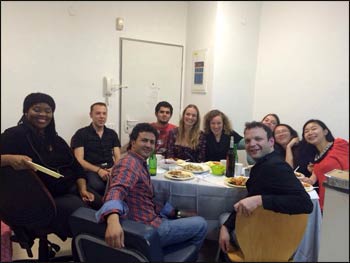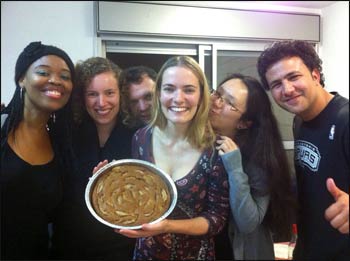Ilona Gerbakher
MAKING HAPPINESS OUT OF OUR DIFFERENCES
Thanksgiving comes to Jerusalem, and I am beside myself with preparations for the feast. Onions sizzle, garlic roasts, chickens brine, and cranberries boil. The windows steam with contented warmth, and aromas crowd around the doorframes. A pan sizzles with crisping chicken skin, a soup bubbles slowly as vegetables melt into the broth. I am in heaven.
I shout directions to my roommates, obedient soldiers in my small but tight-knit army: “Sweep the floors! Set the table! Light the candles!” I make sure the Cabernet Franc pairs appropriately with my spicy-sweet stuffing. I add a bit of butter to the roasted sweet potatoes, and I await my guests.

It seems like the whole world has come to eat at my table tonight: every religion, every nationality, every skin color: Teresa, an African-American Evangelical Christian who is considering converting to Judaism. Lotte, a German woman who recently found Jesus, and who strives to follow in His path of mercy. Jia, an agnostic scholar from China who fell in love with Yiddish literature and the shtetl world of Shalom Aleichem. Hassan, my Catholic-Arab tutor in Levantine Arabic, a decade younger than the other guests, who blushes nervously when Jia’s friend Maggie flirts with him. Letitia, a Columbian student of Akkadian who dreams of becoming an ambassador to Israel. Mohammad, a legal scholar from East Jerusalem who stares at Teresa with hopeful, loving eyes. And then there is me, of course, in all my betty-homemaker glory: the agnostic Jew who teaches Arabic, the mama of the house.
Dinner opens with two prayers. Jeremy, a friend of mine from Harvard and one of the most singular Jewish thinkers of our day, begins his prayer with a question: “When did Americans begin to celebrate Thanksgiving?” For both the Americans and the rest, this turned out to be an unusually difficult question to answer. Frankly, none of us had a clue! Jeremy goes on to tell us that Thanksgiving became a national holiday during the Civil War, and that it instituted a mythology of union and gratitude in America’s darkest, most divided hours. Jeremy went on to recite, from memory, the final, stirring lines of Lincoln’s Second Inaugural Speech two years after the Thanksgiving Proclamation:
With malice toward none, with charity for all, with firmness in the right as God gives us to see the right, let us strive on to finish the work we are in, to bind up the nation’s wounds…to do all which may achieve and cherish a just and lasting peace among ourselves and with all nations.
Jeremy prays that we who live in Israel in these dark and violent days come together – just as we have gathered at our dinner table – and reject senseless divisions and baseless hatreds. He prays that our small communion may light the hearth-fire of a “just and lasting peace” between the peoples of Israel and Palestine.
Lotte follows with a prayer for peace. She asks that the land which birthed Christ, bringer of love and mercy, be worthy of the legacy of its compassionate son. She prays that we meet each other’s differences with humility and gentleness, with patience, bearing with one another in love. She prays for peace. We say amen, and then Lotte opens her eyes and tells us, “This dinner only has one rule – no discussing politics or religion at the table!”
We look at one another and laugh. It’s Jerusalem! If people didn’t talk about religion and politics the walls would collapse, because there would be no air to hold them up! And of course as the wine pours, as the food disappears and dirty dishes pile up, all restraint is abandoned and every rule of polite conversation is broken: Why don’t Muslims believe that Christ is the son of God? Are Christians polytheists because they believe in a Father, a Son, and a Holy Spirit? Why are there so many Jews in banking and in the media? Why does it seem like Islam is more violent than other religions? Why don’t Jews and Muslims get along in Israel – is this a religious or a political conflict? Is the discrimination towards Arabs in Israel comparable to racism towards African-Americans?

As the conversation flies back and forth across the table – liberally lubricated by Israeli wine and Russian champagne – I stand in the kitchen and look at my guests and grin to myself. This is it for me. This is what “interfaith” looks like, although I hate to use such a clinical term to describe such a warm, happy night. This meeting of minds and hearts, these questions full of laughter, plates piling high in the sink, empty bottles of foreign bubbly: this is it. It is people coming together and making happiness out of our differences.
I won’t lie – there are uncomfortable moments, unanswerable questions. When I tell the Evangelical cohort that I simply don’t believe in the idea of absolute truth, I get looks of pity and incomprehension. When Mohammad, as the sole Muslim, has to defend Shariah law, his face drops and the twinkle in his eye dims. Only Jeremy handles all the questions with aplomb, ably explaining why he – a rule-breaking, interfaith-marriage supporting gay Rabbi – should be an exemplar of a new, more welcoming Judaism.
But the uneasy questions themselves are oddly satisfying, staccato counterpoints to the murmurings of sated, slightly drunk new friends. At this table we are all of us doing the good work of joy, enlivened by difference but not threatened by it. As the candles gutter, Lotte turns on the Persian folk song gole sangam, and I pop open the final bottle of champagne.
“L’Chaim,” we shout. To life! “L’Shalom,” Jeremy responds. To peace.

